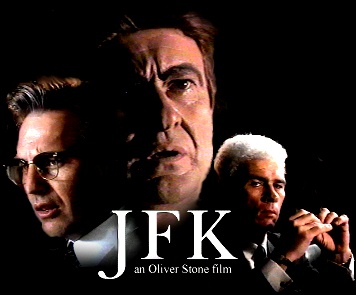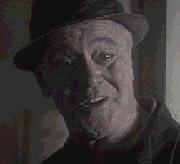JFK
Oliver Stone's JFK

The Cast: In Their Own Words
Jack Lemmon (Jack S. Martin)
"[John F. Kennedy] may not have been the greatest statesman, the greatest this, the greatest that, or greatest anything. But my God, was he a leader." (1)
"This film is not based on fact? What was fact? That stupid report; the cover-up? The Warren Report; that disappointing, terrible thing from that great man [Earl Warren]. It was a whitewash; a total whitewash."(2) "If [the Warren Commission] can make up a myth, why can't Oliver?"(3)
"I had met Oliver, but I had not worked with him and I was dying to. I would have done it without even reading the material. It was a pretty great experience. There was enough material so you were really working with the director, not just someone standing in the background."
"Every director who's really good is unique, and yet there are certain characteristics that the great directors all have. The first one is leadership. And God knows Oliver has that. The same quality Patton had or Nimitz or somebody else running an Army or the Navy. You can walk on his set and not even know what the man looks like, but if you look around, bang, that's the director. Oliver has that kind of presence. He's the captain of the ship and there's no question about it. Actors love to work for Oliver because, even though he's usually the author and knows what he wants, he does not impose it. Like all the great directors, he gives you the freedom to bring what you have to the role. He is very gracious in his respect for what you might contribute, even though he's written it. Oliver, as a writer, can visualize the scene in his mind, but he still doesn't impose it before allowing you, as an actor, to bring something of your own to it. He might accept what you do or reject it, but he allows you to try it, and that's all an actor can ask. An actor has no right to expect it to be done his way, but he does have a right to say, hey, wait a minute, let me try this.
"Oliver reminds me of [Constantin] Costa-Gavras (Missing, Z), whom I respect immensely, in the way he treats actors and also on the level of excitement he brings. Energy. Billy Wilder also has that quality. I have a picture of Billy Wilder sitting down and it's probably worth a million dollars because he only sat down once and that must've been when somebody kicked him. I mean, he had everybody a foot off the floor. Oliver does too. Another thing I love is that he's fearless. The man would shoot in Hell, he really would. And the interesting thing is the crew and the actors would follow him and the cameras would start rolling."
"He [Stone] makes sure things come in on schedule, but he still will take plenty of takes and he doesn't rush you. I think where he's smart is in setting his original schedule so that you don't feel pressure or panic at any time. With some directors, the actors begin to feel they're late if they're fifteen feet away from the camera. You'll never get that with Oliver. He'll stay until Hell freezes over to get the shot he wants. Just in the brief time I was there, I remember one scene where it was just raining like -- I mean, I've seen it rain but oh my God was it raining then! And Oliver had Ed Asner and me walking along drunk and talking. I'll tell you, the difficulty of trying to record the sound track while not hearing anything but Niagara falls was hard enough, but not only that, he had the damn camera on a long tracking shot on top of a crane over the waterfront. But none of this fazed him at all. He was under a poncho and we stayed there until I don't know how long . . . but we got it." (4)
"We were shooting in the offices, just quick cuts of me watching people go in and out, and Lee Harvey Oswald comes in at one point. It's just a quick pop of me looking. Well, those pops took a long time setting up, I can tell you. We worked in an ancient building on the sixth flight, a walk-up where the old elevator couldn't carry half the equipment. So they're luggin' this crap up the stairs and it is so hot and muggy. And then when he went into black and white, he used an extremely harsh light to differentiate for the flashback, and the result, of course, was wonderful, but it goddamn near killed everybody.
"I sat for a take that took less than a half a minute, and at the beginning of the take, I put a newspaper in front of me on my desk. By the time he said, 'Cut,' the paper was smoking. That's how much heat there was. I was in hysterics. I said, 'Oliver, I've been in this business for thirty-nine years and I have never seen anything like that.' And he just said, 'Don't worry, we got plenty of papers.' Then he laughed and kept right on going. I love it. The man is devoted to what he has set out to do. And he will not compromise one millionth of an inch. That separates the very good from the great. That's why he ends up with great footage, because he'll just go through anything to get it." (5)
"[Ed Asner and I worked well together, and only experienced a problem during the pistol-whipping scene.] We didn't have a problem except that Ed belted me with the thing. The first thing I heard was a ringing in my left ear and it lasted for about a week. Of course I told Ed that it was a month. Make him feel guilty. He called me after we got home, called every couple of days to see how I was feeling. But he caught me a pretty good shot. 'Course, that kind of thing can be tough to fake. But we had fun. I did my second Broadway show with Ed as a matter of fact. Thousand years ago." (6)
Ed Asner insists it wasn't his fault. "It was a rubber gun and I know how to fake pretty well," Asner explains. "Somehow or another, the damn gun . . . I never thought about this before but I think maybe Jack in his reaction threw his face into the gun . . . I just could not believe I ever hit him, but then it kept happening. I just know I did not hit him with the goddamn gun. I'm too fine a craftsman to do that . . . I was flabbergasted the first time it happened. And then the next time we did the damn scene, he came up with more blood coming down his face." (7)"It was when we did the stuff where I'm at the racetrack and Kevin comes up and starts talking to me. Now there's about fifteen cutaways there to other things and you hear my voice over it. So each one was a separate scene. I didn't have to sit down and learn five pages. But I did learn the five pages. I didn't say anything, but I was secretly hoping that Oliver would just continue and let me do the whole thing. Let it all happen and roll. So we got there and Kevin sits down facing me and we're going to rehearse the first little thing. So I finished the first little bit, Kevin answers, and that's supposed to be the end of it. Only I just took a beat and then said the next line. I saw a little blink on Kevin's face, but he just continued on. Kevin had learned the whole scene as well, so we just kept trading lines and we went through all five pages. And Oliver shot it that way too. He didn't bat an eyeball. We kept rolling and just went right on through the whole damn thing, which was just great for us as actors." (9)"Ed felt very bad after it happened the first time," Oliver Stone recalls. "And it scared me because I was worried that Jack was hurt and asked him if he thought we should break. But you know Jack. He said he was okay, so we tried the scene again. Well, now Ed was being so careful, it didn't look good. It looked fake. So Jack kept reassuring him. 'C'mon Ed, make it look good,' he'd say. 'Take a good swing this time.' So finally, Ed got into it again and we started shooting, and wham! He hit Jack again. And this time Jack wasn't getting up. I was horrified. I could just see the headlines in tomorrow's paper: 'Madman Stone Sends Nice Guy Jack Lemmon to Hospital.' Then Jack got up and shook it off and damn if he didn't want to do the scene again." (8)
"[I was also impressed with Stone's crew.] He's got people that worked on every damn film he's done. They kill themselves. I don't know when they sleep. Maybe he's just whittled it down to people who don't sleep. When I left they were going into some frigging swamp and everybody was given these pages of what to bring for snakebites, mosquitoes, and everything else, plus the heat. I thought, 'I'm getting out of here just in time. I'm too old for this crap.' Holy Moley." (10)
Back
You may wish to see:
Who's Who in the Jim Garrison Case
Jim Garrison's New Orleans Photo Gallery
Articles and resources on the JFK assassination
1. Beyond JFK: The Question of Conspiracy (1992), Warner Video, directed by Danny Schechter and Barbara Kopple.
2. Beyond JFK: The Question of Conspiracy (1992), Warner Video, directed by Danny Schechter and Barbara Kopple.
3. Harrison E. Livingstone, High Treason 2 (New York: Carroll & Graf, 1992), p. 530.
4. James Riordan, Stone (New York: Hyperion, 1995), pp. 379-80.
5. James Riordan, Stone (New York: Hyperion, 1995), p. 381.
6. James Riordan, Stone (New York: Hyperion, 1995), p. 382.
7. James Riordan, Stone (New York: Hyperion, 1995), p. 382.
8. James Riordan, Stone (New York: Hyperion, 1995), p. 382.
9. James Riordan, Stone (New York: Hyperion, 1995), pp. 382-83.
10. James Riordan, Stone (New York: Hyperion, 1995), p. 383.
